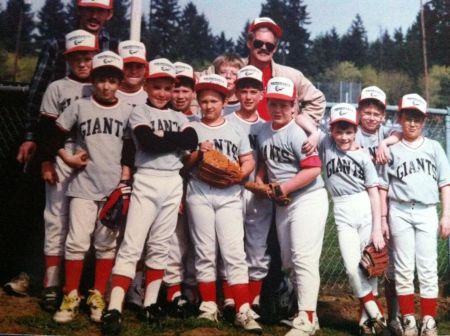I was 10 or 11 years old when I stepped from the on-deck circle and looked up the third baseline to get the sign from coach. I hated coming to the plate in these situations. This time was even worse. This time we were down by a run. It was the last inning. The tying run stood on third base. I certainly wasn’t the strongest batter on the team, one might even say I was one of the weaker ones. Coach knew this. Despite my weakness swinging the bat, I was good at laying down a bunt. Coach knew this too. My heart pounded into my throat when I received his sign. Hopeful I had misunderstood, I kept looking, waiting for clarification. Again it came. Coach called the suicide squeeze.
I knew that as soon as the opposing pitcher began his windup, my teammate would sprint from third base toward home plate. He’d be halfway down the baseline when the ball reached the plate. That’s the suicide part. If I don’t do my part, he’s a goner. My part? Square my shoulders, level my bat, make contact with the ball, and run toward first base. No matter what. If everything went as planned, my teammate would cross home plate before the third baseman or the pitcher could retrieve my bunted ball and make the out. That’s the plan anyway.
Nervously, I entered the batter’s box. My knuckles white with anxious courage. I could hear my heart beat in my ears. From the corner of my eye, I saw my teammate begin his trusting sprint toward me. The ball left the pitchers hand. It was time-the moment the game was riding on. Everything I had learned depended on this moment. My team depended on me.
I squared my shoulders. I leveled my bat. Wait! I was in luck, the pitch was a ball! Low and outside! Relieved, I pulled back my bat, grateful I had escaped near certain embarrassment.
Before the catcher even caught the ball, I realized what I had done. I saw my teammate running toward home, a look of surprise and amazement on his face as he realized what I’d done. I had one job. Make contact with the ball. When the moment came, my youthful inexperience and inability to handle the pressure of the situation overcame my training and the expectations of everyone who depended on me. I stepped back from the batter’s box just in time to allow the catcher to easily tag my teammate for the second out of the inning.
A few strikes later, I walked back to the dugout. Frustrated and discouraged, I had struck out for the last out of the game. Game over. At least I went down swinging.
What does one of my childhood’s most shameful moments have to do with anything?
This week marks “the moment” in the lives of many of you high school seniors. After donning cap and gown, you will walk up to the batter’s box. You will step up to the plate with all your training and experience. You will take everything we taught you-everything you learned from parents, teachers, and classmates and you will give this suicide squeeze we call life your best effort. Your part? Make contact-make those choices that will allow those around you, especially your friends, to safely reach their destination. Wherever that might be.
Along the way, you will face a bad pitch. A bottle of alcohol. A heavy accelerator pedal. A couple of out-of-town parents.
You will probably face several bad pitches and you will have to make the right decisions.
When bad pitches come, and they will come, remember your training. Remember what you’ve learned at school and what your parents taught you. You can handle bad pitches. Square your shoulders and make the safe decision. Make the decisions-the decisions that help your friends reach their destination safely.
If you stumble, if you make a bad choice, if you fall, fix it. Get up, step up to the plate, stand tall and fix it. Make the better choice. You have your whole lives ahead of you. Make the choices that will keep your game going. Be the player your teachers and parents taught you to become.
Tags: Columbia River, Evergreen, Graduation, Hudson's Bay, Skyview, Vancouver, VSAA, Washington

Leave a comment